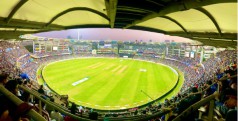



















Sunday, Jul 07, 2024 08:30 [IST]
Last Update: Sunday, Jul 07, 2024 02:59 [IST]
Travelling during monsoon is one of the most adventurous and
fun experiences you can have when dark clouds shower drops of bliss on
earthlings. Monsoon season is one of the best times of year for travellers to
explore a rainforest, a beachside town or a hilly city which offers ecstasy,
beauty, and divine delight.
If you’re planning a trip during this rainy season, the
constant temperature shifts can take a toll on your skin and leave it irritated
and oily. The high humidity can affect skin health negatively. Like any trip to
a faraway destination, preparation is key. The following practical tips explain
how to travel during the rainy season:
Use Waterproof Sunscreen
Despite the rain and cloud cover during monsoon season, UV
rays can still harm our skin, even on overcast days. Sun is barely visible in
this season, so people tend to skip the sunscreen thinking their skin will not
get damaged as the weather is cloudy and rainy. However, UV radiation can be
higher during cloudy days because the clouds can reflect and scatter the UV
rays, increasing their intensity. The weather is humid and the thick
formulation of sunscreens can make your skin oily, sticky, and sweat all day.
So it would be a good
idea to pick something that’s gel-based lightweight and does not end up
clogging your pores. For the monsoon season, one must opt for water-resistant
sunscreen. A single application will not protect your skin the entire day. Sunscreen must be reapplied every three
hours for the best result and strictly to reapply after prolonged sun exposure,
heavy sweating, swimming, or heavy exercising.
Keep it Minimal
Applying makeup can be challenging during humid weather
during travelling as they might have a chance of melting in the rain. In the
monsoon season, less is always more. So, you may want to consider pausing the
usage of heavy moisturisers and facial oils for skin preps.
Embrace a minimalistic approach to your makeup routine. Opt
for a natural, dewy look with gel-based moisturisers and lightweight serums
enriched with hyaluronic products that enhance your features rather than
masking them. For your base, you can also substitute a foundation with a BB or
CC cream to even out your complexion followed up with a hydrating concealer to
cover up any blemishes
Antifungal Treatment
A jump in a puddle in
the rain might satisfy your inner child but this could cause a host of fungal
infections to you. High levels of humidity in the air allow bacteria and
infections to multiply with ease which leads to problems like itching,
swelling, and a foul smell. The air is saturated with moisture during the rainy
season that makes it an ideal breeding season for bacteria, viruses and fungi.
Lotion based moisturizers are better than cream based ones in this season. Pure
coconut oil provides instant relief. In its unheated form, coconut oil works as a potent antifungal agent. Applying
it over the skin makes it a good, safe topical medicine.
Neem oil is considered a natural antifungal. Neem is easily
available and works as one of the best treatments for fungal infections.
Washing the infected area with neem water helps in treating fungal infections.
To make neem water, boil neem leaves in water for a few minutes and let it
cool. It can be used to massage the feet
and can be applied to the toes. Lightly dab the neem oil onto the area using a
cotton swab or cotton ball, and allow it to soak in for up to 30 minutes. Wash
off the oil with warm water.
Dry and crush some neem leaves. Add this powder to
sandalwood powder and make it a paste with rose water. Now apply this paste to the area where you
have the infection. in feet and nails
Hydration
Dehydration is a common complaint during travelling in hot
and humid weather. Water makes up 70% of our body mass and is one of the most
vital nutrients. On average, an adult needs 2-3 litres of water daily to stay
well-hydrated. During monsoon, your drinking water may get contaminated and
hence packaged mineral water is best during monsoon because it is loaded with
essential minerals and nutrients. You
must try tender coconut water, lime water, kokum squash, buttermilk, soups and
fruits-vegetables with high water content like watermelon, cantaloupe, cucumber
etc. to keep the body hydrated.
